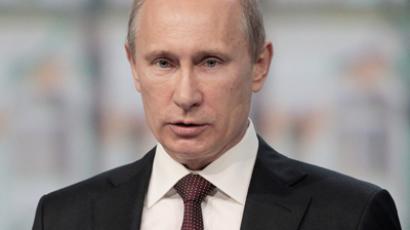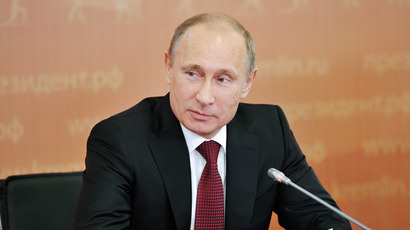BRICS dumping euro amid simmering EU banking crisis

Brussels has been forced to eat a generous slice of humble pie: A massive sell-off of the euro is underway in the wake of a persistent financial crisis, as holdings in the European currency by emerging economies were slashed by almost 8 percent last year.
Emerging economies – including Brazil, Russia, India, China and South Africa (BRICS) – are dumping the euro, having sold €45 billion of the currency in 2012, according to data gathered by the International Monetary Fund.
The euro represents just 24 percent of their reserves, the lowest level since 2002 – the year when euro coins and banknotes first entered circulation – and down from a peak of 31 percent in 2009. At the same time, the euro's share of total global reserves has also fallen. This change of fortune for the euro is blamed on several factors, including sovereign debt crises and rapid growth by BRICS nations.
Last week, China and Brazil agreed to a $30-billion swap deal that would give each the ability to borrow the other's currency in the event of future turbulence in the global financial system. The move undercuts the need to use the dollar as a reserve currency; given China’s increasing economic might, Beijing appears to be steadily promoting its national currency, the renminbi.
The US dollar, which has been designated the world’s reserve currency since the Bretton Woods agreement in 1944, continues to hold ground at about 60 percent of emerging markets’ reserves.
This ‘euro flight’ is disturbing news for Brussels and the eurozone: The euro's challenge to the international status of the US dollar has been “set back a generation,” as new data show developing countries dumping the European currency from their official reserves, FT reported, citing IMF data.
This retreat of the European currency, once heralded as a serious rival to the ubiquitous dollar, offers a shocking glimpse at the severity of Europe's sovereign debt crisis, which recently saw Cyprus take the unprecedented step of penalizing wealthy bank depositors in order to avoid bankruptcy.
"It'll be the number-two international currency, but I wouldn't say there are any prospects of it challenging the dollar," Jeffrey Frankel, professor of economics at Harvard's Kennedy School of Government told FT.
However, the sheer size of the eurozone – 17 EU member-states that have officially accepted the euro as their common currency – continues to make the euro competitive as a reserve currency, Frankel emphasized.
At the same time, investors are becoming nervous about whether the euro will remain attractive over the long haul, haunted as they are by the ghosts of the Spain, Italy, Greece and Cyprus disruptions.
The euro may regain its shine if Europe moves towards “fiscal union and a single sovereign bond market,” FT noted. However, the EU may have missed its chance to act as “big shifts in the global economy boost new emerging market currencies,” such as China’s renminbi, presenting a bold challenge to both the euro and the dollar.
"The dollar is holding its own for now, and we are moving towards a multicurrency system," Edwin Truman, senior fellow at the Peterson Institute think-tank in Washington told the UK business paper.
Currently, the euro is used daily by some 332 million Europeans.
Robert Bridge, RT














